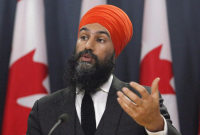Support strong Canadian climate journalism for 2025
Canada's public-safety ministry will reconsider the way Sikh organizations are described in a recent report outlining terror threats in Canada, the department's minister Ralph Goodale said Friday.
The Canadian Sikh community, including one of Goodale's fellow Liberal MPs, wants him to do far more than fix a few words.
Goodale said he is confident the security officials who wrote the 2018 report on terrorism threats facing Canada did not mean to malign entire religions when describing Sikh, Shia and Sunni extremism but he is still asking them to make changes to be more precise.
"Words matter," Goodale said. "We must never equate any one community or entire religions with extremism."
Balpreet Singh, a lawyer representing the World Sikh Organization of Canada, said Goodale has missed the point. Singh said this is the first time Sikh extremism has been mentioned in the annual terror-threat assessment but provides no evidence for doing so. He said the only incident the report mentions is the bombing of an Air India flight leaving Canada for New Delhi and Mumbai. That attack killed 329 people but it was in 1985.
"Reevaluating the language is fine but just the fact that this section was there is very troubling given that there is absolutely no context beyond something that happened three decades ago," said Singh.
The report says "some individuals in Canada continue to support Sikh (Khalistani) extremist ideologies and movements."
Khalistan is the name for an independent Indian state proposed by some Sikhs. Extremists demanding Sikh independence were behind the Air India bombing, but Singh said there is simply no evidence Sikh extremism exists in Canada today. He said just advocating for an independent Sikh state is no different from wanting Quebec to separate from Canada.
However several Indian government leaders have pushed Canada to suppress calls here for Sikh independence, and the issue was a major rain cloud over Prime Minister Justin Trudeau's visit to India last February. That trip was one of the low points of Trudeau's time in office so far, dogged not just by the prime minister's decision to wear high-end Indian wedding attire at many public events but also by invitations to two receptions given to a man convicted in 1986 of attempting to assassinate an Indian cabinet minister who had been visiting Canada.
Liberal MP Randeep Sarai, who apologized during the trip for being the one who invited attempted murderer Jaspal Atwal to the receptions, was among those demanding the federal government explain why Sikh extremism was named in the report. In a social-media post Sarai said the report looks at 12 years of terrorist plots or attacks in Canada and not a single one of them involved Sikhs. Neither was Sikh extremism mentioned in incidents affecting Canadians abroad.
Trudeau spent much of the India trip working to dispel accusations that Canada was a hotbed of Khalistani extremism. At the end of it he agreed to a security framework with Indian Prime Minister Narendra Modi, who is Hindu, that committed to combating terrorism, including several Sikh extremist organizations.
The organizations named in that framework, Babbar Khalsa International and the International Sikh Youth Federation, were also named in this week's terror-threat assessment.
A lot of the concern raised with Trudeau in India was about Canadians financing Sikh extremist activities in India. Financing was mentioned in this year's report.
"Furthermore, Shia and Sikh (Khalistani) extremism also remain of concern because while their attacks in Canada have been extremely limited, some Canadians continue to support these extremist groups, including through financing," the report said.
Singh said he thinks the Canadian government is falling prey to foreign interference on the matter and he said unless the government can provide new evidence that Sikh extremism exists and is a problem in Canada, the government needs to remove that entire section from the report.
"Give us some sort of proof," he said.
NDP MP Matthew Dube, who sites on the Commons committee on public safety and national security, said Friday the government needs to do more than scrub certain words from the report.
"The Liberals have offered no clear explanation and provided no evidence for this addition in the first place which targeted a specific community," he said.





Comments